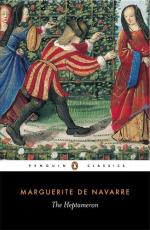2 The Duke here referred to was Alexander de’ Medici, first Duke of Florence, in which city he was born in 1510. His mother, a slave named Anna, was the wife of a Florentine coachman, but Lorenzo II. de’ Medici, one of this woman’s lovers, acknowledged him as his offspring, though, according to some accounts, his real father was one of the popes, Clement VII. or Julius II. After the Emperor Charles V. had made himself master of Florence in 1530, he confided the governorship of the city to Alexander, upon whom he bestowed the title of Duke. Two years later Alexander threw off the imperial control, and soon afterwards embarked on a career of debauchery and crime. In 1536, Charles V., being desirous of obtaining the support of Florence against France, treated with Alexander, and gave him the hand of his illegitimate daughter, Margaret. The latter—whose mother was Margaret van Gheenst, a Flemish damsel of noble birth—was at that time barely fourteen, having been born at Brussels in 1522. The Queen of Navarre’s statements concerning the youthfulness of the Duchess are thus corroborated by fact. After the death of Alexander de’ Medici, his widow was married to Octavius Farnese, Duke of Parma, who was then only twelve years old, but by whom she eventually became the mother of the celebrated Alexander Farnese. Margaret of Austria occupies a prominent place in the history of the Netherlands, which she governed during a lengthy period for her brother Philip II. She died in retirement at Ortonna in Italy in 1586.—L. and Ed.
Among these there was one very beautiful, discreet, and honourable lady, sister to a gentleman whom the Duke loved even as himself, and to whom he gave such authority in his household that his orders were feared and obeyed equally with the Duke’s own. And moreover the Duke had no secrets that he did not share with this gentleman, so that the latter might have been called his second-self. (3)
3 The gentleman here mentioned was the Duke’s cousin, Lorenzo di Pier-Francesco de’ Medici, commonly called Lorenzino on account of his short stature. He was born at Florence in 1514, and, being the eldest member of the junior branch of the Medici family, it had been decided by the Emperor Charles V. that he should succeed to the Dukedom of Florence, if Alexander died without issue. Lorenzino cultivated letters, and is said to have possessed considerable wit, but, on the other hand, instead of being a high-minded man, as Queen Margaret pictures him, he was a thorough profligate, and willingly lent a hand in Alexander’s scandalous amours. The heroine of this story is erroneously described as Lorenzino’s sister; in point of fact she was his aunt, Catherine Ginori. See Appendix, C.— Ed.
Finding the gentleman’s sister to be a lady of such exemplary virtue that he was unable to declare his passion to her, though he sought all possible opportunities for doing so, the Duke at last came to his favourite and said to him—




